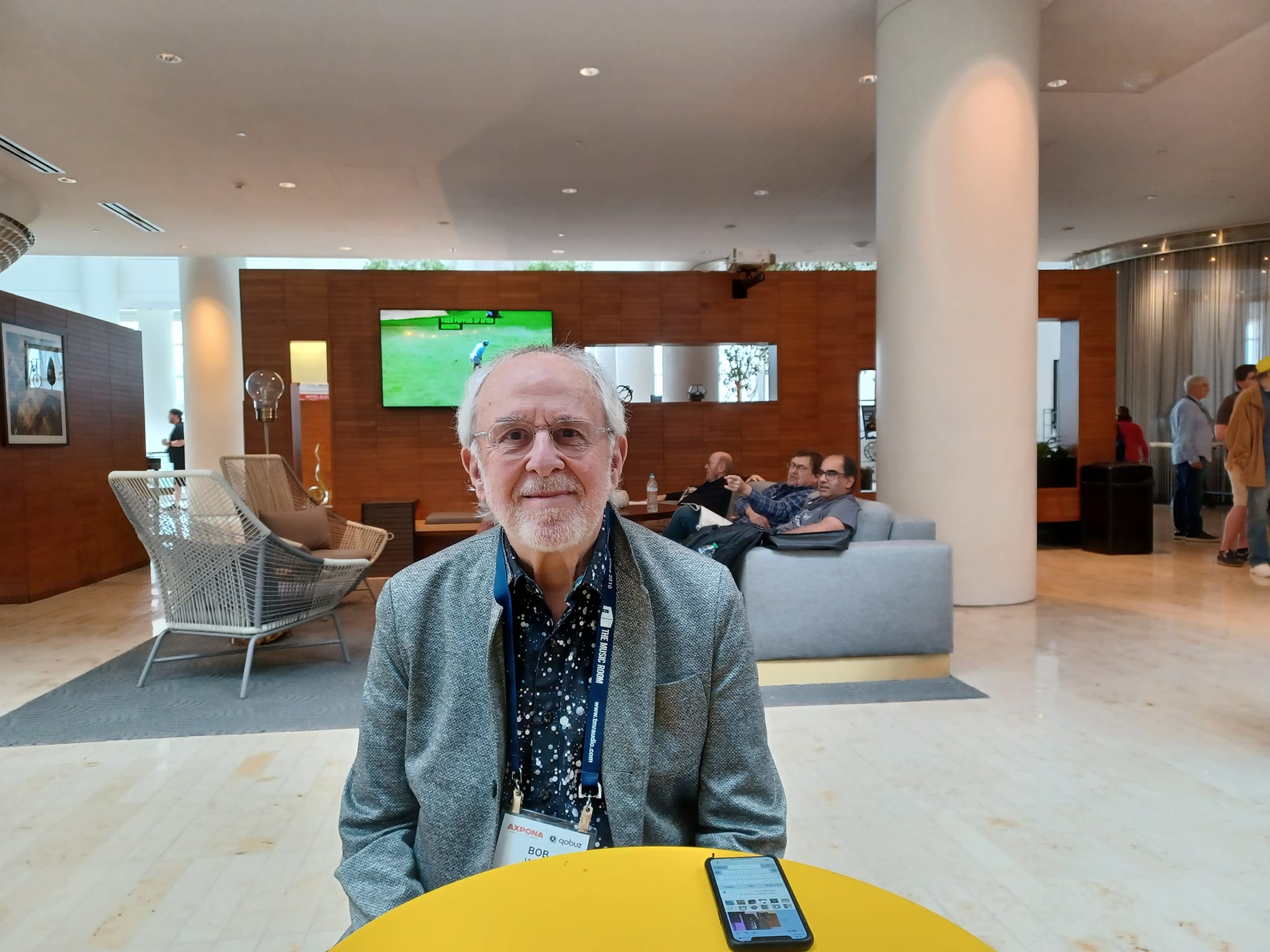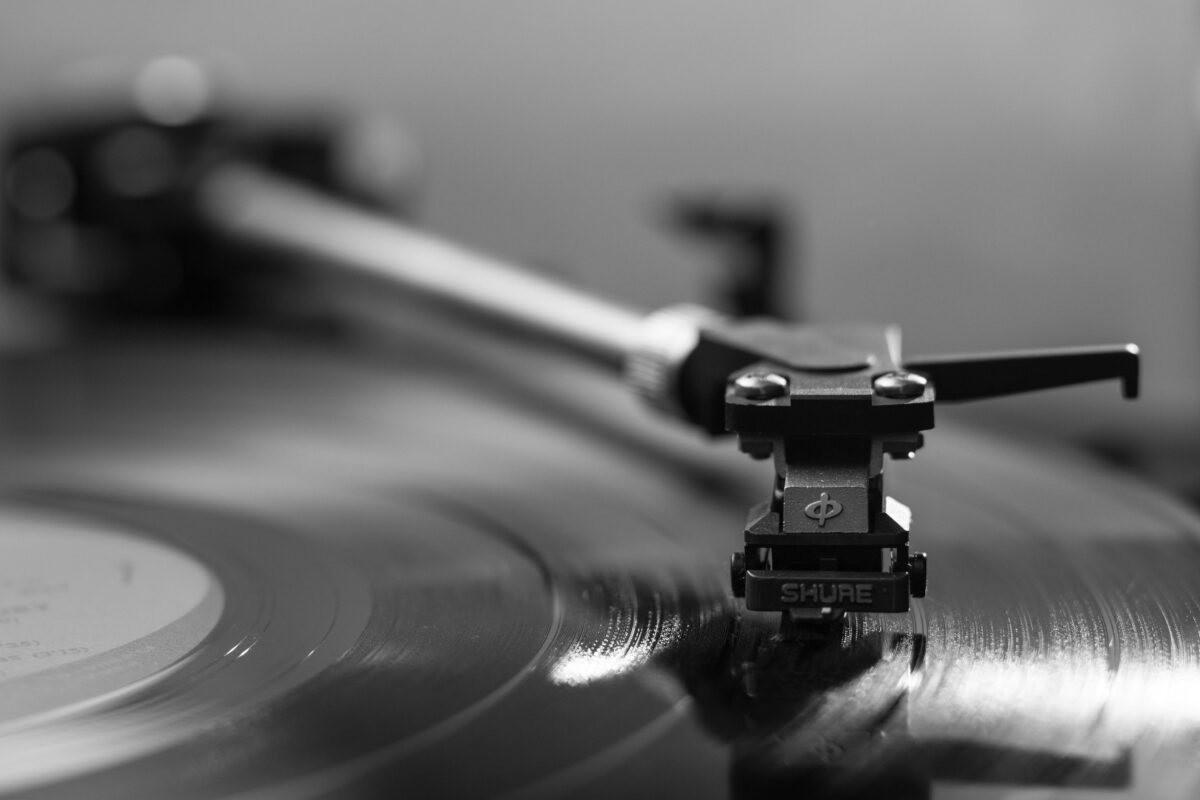You Never Know Who You’ll Run Into at AXPONA: A Chance Encounter with Bob James
- BLOG
- by Jeff Wilson
- May 10, 2023

Interviewing musicians is typically a multi-step process. You reach out to a marketing rep who sets up a time slot for a Q&A, and then you have X number of minutes to converse with someone who’s squeezing you in between other interviews. Prior to the interview, you prepare some questions.
There are other scenarios, however. Like this, example: At nine o’clock one morning, in a pre-caffeinated state, you’re waiting for your first cup of coffee to cool down at a table in a hotel when all of sudden a well-known musician you recognize starts walking past you.
Which is what happened to me at this year’s AXPONA.
The musician I thought I recognized is a keyboardist, arranger, and producer who had an outsized presence on the CTI label during its heyday, is big in Japan, has won two Grammys and been nominated for 18 others, recorded the theme song to Taxi, has been sampled by countless hiphop artists, still tours around the world, and is currently recording for an audiophile label.
In other words, Bob James—but just to be on the safe side I checked his name tag. Later that morning James was slated to sign his latest Evosound release, Feel Like Makin’ Live, so it made sense that he was wandering around the building. So were nine thousand other people, however, so the odds of us bumping into each other were slim.
I asked him if he’d like to talk for a minute, and we ended up chatting for 45 minutes. I told him it seemed apropos he was attending the event, as he certainly is no stranger to the audiophile community. Going back to an early period in James’ career, Rudy Van Gelder engineered many albums on CTI that involved James as a leader or contributor. To leap forward a few decades, Evosound is an audiophile label based in Hong Kong. As we started to talk, Bob James made it clear that he was familiar with The Absolute Sound, which makes sense, considering his dedication to good sound.
Our chat was quite casual, and there were times when he asked me questions—about TAS, about AXPONA, about my record collection. It turns out both of us are vinyl lovers, and he even showed me a photo of his record collection, which is now housed in some custom-designed shelves in his home in Michigan. When I asked what he’d been up to lately, James, who’s now 83, made it clear that he’s been doing quite a bit of touring.
“Unlike what I would have expected at my age—most people think about retirement or taking it easy, but music is my life,” he explained. “And I love performing. And while I have the energy and the willingness to do it—it seems like I say ‘Yes’ to things more often than I did even in the past. So I’m doing a lot of traveling. I have a very young band that plays with me. I love the challenge of trying to keep up with them.”
His thoughts then turned to AXPONA.
“I love learning things about the way other people are experiencing music,” he said, and he spoke positively about “a whole industry like this, a convention like this, that’s devoted to all the different ways that music can be heard in a more realistic manner.”
He was curious about my role as the music editor of The Absolute Sound, and I told him about that. His response?
“As you were describing your world, I was realizing that mainly what I want to do is cry,” he said. “You see, I have to admit to you that I’m now wearing hearing aids, and that a very fundamental part of this world makes me sad because I can’t appreciate it. I get it, and there was a time in my life when I would have been having a freakish unbelievable time in this building. I would have been going completely nuts, and I would have been talky talky talky about every aspect of it. Now that is a memory in my life.”
Needless to say, his decline in hearing has affected his recording process.
“We have to speak a double language and we have to translate for each other,” he said about recording engineers. “I tell them what I want him to make the music sound like even though, when I’m going to be listening back to it, I won’t be able to communicate directly in the way that I would have.
“I still want the music to sound good. That’s what I want, but the very basic essence of it is humbling, and that’s why I want to cry.”
But, I said, his musicianship hasn’t diminished. After knocking on wood, James said, “I’m hanging in there. I’m hanging in there with the music and piano music, and a piano player plays it with his fingers, and his brain’s telling how loud to play each note. And if he’s playing Mozart, he’s got to play a certain way, jazz a certain way, a blue million things.
“Then it starts to come into your world where there’s a microphone and there’s an engineer. ‘How do you translate that?’ But even before you get there, there are all these other variables—the piano itself, is it a Yamaha or a Steinway or is it a Fazioli? You can have a million conversations about that. ‘I prefer the tone of the Fazioli, I prefer the Steinway, and I prefer hard action or soft action,’ but all of those things are related to what they sound like, and I say humbly to you—in the 70s I was so deeply into the difference between a Yamaha and a Steinway and a Chickering and a Baldwin and probably on a blindfold test I could say, ‘That’s a Baldwin or that’s a Chickering or that’s a Casio.’ I knew the subtlety of the piano tone. I don’t have that any more. But I have the memory of it.”
“The essence of it, the world of it is still my life, and when I go to the piano now, I’m trusting my fingers with a lifetime of whether this note is going to be a 34 velocity or a 35. My friends that listen to me are telling me that I’m still playing piano the way I used to even though I’m not hearing a Steinway as opposed to a Fazioli, I’m hearing a memory of it.”
Understandably, James advised me to avoid rock concerts.
But you didn’t play rock concerts, I said.
“No, but in my field, year by year I could feel the engineers, they went louder, louder, louder,” James said. “I fought it as long as I could, but overall, stage volume in every profession has gotten louder, louder, louder.”
I asked him about Japan, where he has long been a highly respected artist.
“I have a long history there,” he said, “both audio and music and everything, and I’m happy that it’s a Japanese company that I’m representing today. Evosound has been great to me in terms of presenting my music in a high-end audio community and having the records be demo records for high-end. Ashley Whitfield, the president, is very interested in having an artist on his label who makes music that is very often identified with high-end audio.”
Although our conversation involved, at times, a fair amount of soul-searching, there was as much humor as there was gravitas, and our whole conversation passed in a light-hearted manner. Repeatedly we talked in geeky record-collector terms about our love for vinyl. I told him that when I have a dedicated vinyl listening session at home, I tend to favor small-group acoustic jazz, and I asked what he preferred in that situation.
“Because my world is playing the stuff that you talked about, at home very often I listen to classical music,” James said. “That’s my hobby because that’s less my real world. When I’m listening to jazz, I’m probably going to be critical.”
Suddenly our conversation took an unexpected turn, as Nick Getz, the son of tenor saxophonist Stan Getz, walked past us. Along with Abey Fonn, Nick discussed the upcoming 1-Step of Getz/Gilberto release at AXPONA at various points that weekend.
“That’s Stan Getz’s son right there,” I told James.
“You’re kidding,” James said. “I produced Stan Getz and played with Stan Getz many times.”

Nick Getz looks a lot like his father—same hair, face, and build, and he even sounds like him when he talks—and it was great fun introducing him to someone who worked with Stan when he looked a whole lot his son does now. (Talk about déjà vu.) Bob James told Nick Getz about working with his father and how much respect he had for him as a musician, and Nick was clearly touched by that.
After Bob James disappeared into the mass of people hoping to hear as much high-end equipment as possible, I started to process our conversation that morning. Due to hearing loss, this veteran musician no longer gets the full experience when he plays and records, but his commitment to music remains steadfast and he finds a way to make it work. At an event where distractions were numerous and opportunities to reflect were few, that message did not get lost.
By Jeff Wilson
This will take some explaining, but I can connect the dots between pawing through LPs at a headshop called Elysian Fields in Des Moines, Iowa, as a seventh grader, and becoming the Music Editor for The Absolute Sound. At that starting point—around 1970/71—Elysian Fields had more LPs than any other store in Des Moines. Staring at all the colorful covers was both tantalizing and frustrating. I had no idea who most of the artists were, because radio played only a fraction of what was current. To figure out what was going on, I realized that I needed to build a record collection—and as anyone who’s visited me since high school can testify, I succeeded. Record collecting was still in my blood when, starting in the late 1980s, the Cincinnati Public Library book sale suddenly had an Elysian Fields quantity of LPs from people who’d switched to CDs. That’s where I met fellow record hawk Mark Lehman, who preceded me as music editor of TAS. Mark introduced me to Jonathan Valin, whose 1993 detective novel The Music Lovers depicts the battles between record hawks at library sales. That the private eye in the book, Harry Stoner, would stumble upon a corpse or two while unraveling the mystery behind the disappearance of some rare Living Stereo platters made perfect sense to me. After all, record collecting is serious business. Mark knew my journalistic experience included concert reviews for The Cincinnati Enquirer and several long, sprawling feature articles in the online version of Crawdaddy. When he became TAS music editor in 2008, he contacted me about writing for the magazine. I came on board shortly after the latest set of obituaries had been written for vinyl—and, as fate had it, right when the LP started to make yet another unexpected comeback. Suddenly, I found myself scrambling to document all the record companies pressing vinyl. Small outfits were popping up world-wide, and many were audiophile-oriented, plus already existing record companies began embracing the format again. Trying to keep track of everything made me feel, again, like that overwhelmed seventh grader in Elysian Fields, and as Music Editor I’ve found that keeping my finger on the pulse of the music world also requires considerable detective work. I’ve never had a favorite genre, but when it comes time to sit down and do some quality listening, for me nothing beats a well-recorded small-group jazz recording on vinyl. If a stereo can give me warmth and intimacy, tonal accuracy, clear imaging, crisp-sounding cymbals, and deep, woody-sounding bass, then I’m a happy camper.
More articles from this editor





















